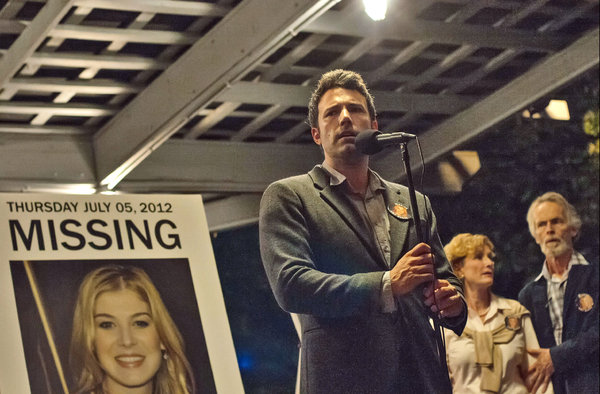
Ben Affleck puts in his best performance as Nick Dunne, a man who probably should’ve picked a better wife in Gone Girl.
After sitting here in front of the monitor looking at a blank page where a review is supposed to be, I finally came to the simple conclusion that David Fincher’s Gone Girl is really not that a good movie.
But damn if it’s not an entertaining one.
Based on the 2012 novel by Gillian Flynn (who also wrote the screenplay), the film stars Ben Affleck as nebbish dudebro Nick Dunne and Rosamund Pike as his seemingly perfect (to a fault) wife, Amy.
On the outset, the film presents itself as a standard, sober mystery, with Affleck’s Dunne returning home from the bar he runs with his twin sister Margo (Carrie Coon) to find Amy missing. However, what begins as the makings for a standard thriller veer almost instantly into a sort of pseudo-parody of these sorts of stories. I couldn’t help but be amused by how quickly search efforts ramp up for Amy after only a day, when in reality, many people (especially non-white women) go missing for weeks before anyone raises a stink.
It was in that which I realized maybe Gone Girl planned on being something much different (and hopefully better) than the material initially gave up, and ultimately that’s where its problems also begin. While the film weaves the viewer between Amy’s diary entries and Nick’s half-truths, the expectation is that Nick may have killed his wife, even though the film doesn’t do very much to sell that point. It didn’t take long to realize that maybe neither Nick or Amy were telling the complete truth, and as that happened, the film also turned from a beach novel thriller to a straight-faced farce.
In fact, so much of Gone Girl is played for laughs, I was forced to wonder if Fincher was the right man for the directing job. Visually, the film screams Fincher, as he continues his aesthetic of sterile scenes. Nothing in Fincher’s world ever looks lived in, from the rented McMansion the Dunnes share (absolutely nothing looks out of place, even when it’s supposed to) to the abandoned shopping mall filled with vagrants all perfectly placed as if to evoke a vision of art-deco squalor.
Other, far more experienced, reviewers may be amazed by Fincher’s technique of sparse, muted colors and mood indigo lighting, but in a way, it sells a sort of dullness that blunts this film in a way that it shouldn’t. Two-thirds of this movie are awash in laughs, and yet at no point is this film presented as a black comedy, which it should’ve been.
Driving home from the theater, I immediately thought this film would’ve been much, much better if directed by Danny DeVito circa 1989, starring Michael Douglas and Kathleen Turner, but then that was War of the Roses, wasn’t it? That attitude, that feeling would’ve been very welcome in Gone Girl, but instead what we get is something more maudlin, and the laughs come from the increasingly incredulous situations as we see just how fucked up Amy Dunne actually is.
But as I said at the beginning of the review, for all its faults, Gone Girl is damned entertaining, something that is exclusively due to the performances. You’ll read a number of reviews praising Ben Affleck for turning in one of the best performances of his career, and certainly there’s a good amount of truth to that, the problem unfortunately is that Affleck doesn’t go all the way. Nick is a character who should be more unlikable, but because he isn’t, his own transgressions are shoved aside much easier than they should’ve been. He is no hero, nor should be be due to his own actions, but instead he’s cast much more sympathetically, and it blunts what should be sharper edges in the film.
However the real star of this film is Rosamund Pike, whose Amy Dunne could quite possibly go down in film history as the most vindictive bitch in cinematic history. But don’t let that sound like she’s a one-note character. Regardless of your feelings for Amy, it’s hard not to be sympathetic for her, while actively wondering whether her actions come from a place of nature or nurture.
Everything about Amy has been skillfully crafted and positioned, but not always by her. As a child, her parents made a fortune writing about her exploits as “Amazing Amy”, despite the fact that none of those things were true. It’s easy to see how that carried over into her adult life, except now she drove the narrative, not her parents. That level of subtext is fresh and not necessarily something we’ve seen in films recently.
Of the other solid performances in the cast, Kim Dickens and Patrick Fugit stand out as the detectives who are lukewarmly on Nick’s trail as they try to determine his guilt in a droll, almost lackadaisical way, as their thoughts on his guilt waver from ambivalence to falling susceptible to public opinion, which serves as one of the underlying themes that comes across as subtle as a thud.
But I’d be remiss if I didn’t single out one performance in particular: Tyler Perry (yes, that Tyler Perry) as cocksure superstar attorney Tanner Bolt. It’s never been a secret that I’ve been no fan of Perry and his minstrel factory, but his Tanner Bolt was engaging without being smarmy, and delivered some rather deft punchlines. As much as I dislike Tyler Perry, I found myself loving his Tanner Bolt. If this was the sort of characters he had in his films, I’d probably pay to see one of his movies, but I make no promises.
Of the performances I could’ve done without, Neil Patrick Harris’ penis stands (or limps) among them. In fact, there was probably more penis in this film that was in any way, shape or form was necessary. But that brings me to one last, related point.
Many will wonder whether or not Gone Girl is an exercise in misogyny. Thinking critically, it’s reasonable to see where some could look at Amy’s portrayal of a gross caricature and critique of feminism. Of course, as a man, me saying that’s wrong would be considered “typical”, but I argue that while this movie is about a woman who seizes power, which in turn subjugates men, this is an attempt at a character study which is simply not done very well. What Amy does, she doesn’t do because she is a woman, she does it because she’s her. She’s a fictional creation who only knows how to work within fiction, even when that includes fictionalizing the men in her life. For Amy, life is narrative, and there is an undeniable entertainment factor to it.
That said, no matter how entertaining it is to see how Gone Girl unfolds, as a film it is a hollow experience that only leaves the viewer wondering all the many ways in which it could’ve been better. The movie, as directed by Fincher has no real idea what it wants to be. Is it a black comedy? Is it a tense thriller? Is it a satire? Who knows?
In the end, that level of indecision, that lack of identity is the difference between a good movie and the opposite. But make no mistake, even bad movies are innately watchable, and Gone Girl absolutely falls within that category. However, there’s just one caveat, if you see this movie, and it is worth seeing if only for the performances, I’d steer away from taking a date, because you’ll be getting/giving the side eye the rest of the night, and who really wants that?
Hashim R. Hathaway (Uncle Shimbo) is the host of the Never Daunted Radio Network, and proud father to NeverDaunted.Net. You can reach him on Twitter @NeverDauntedNet
